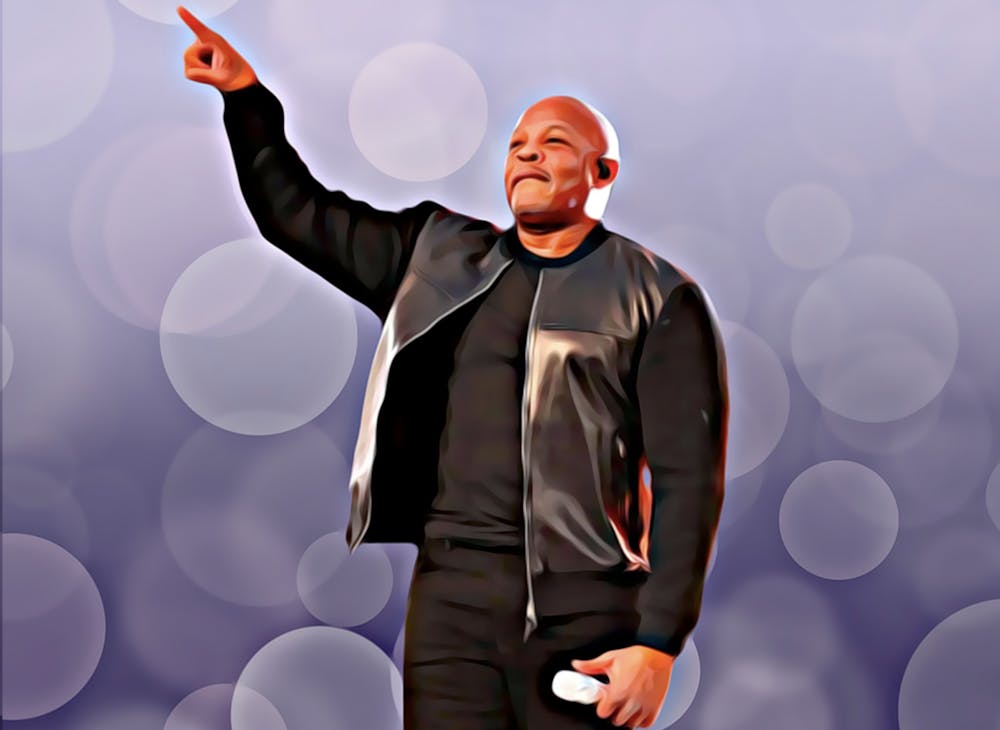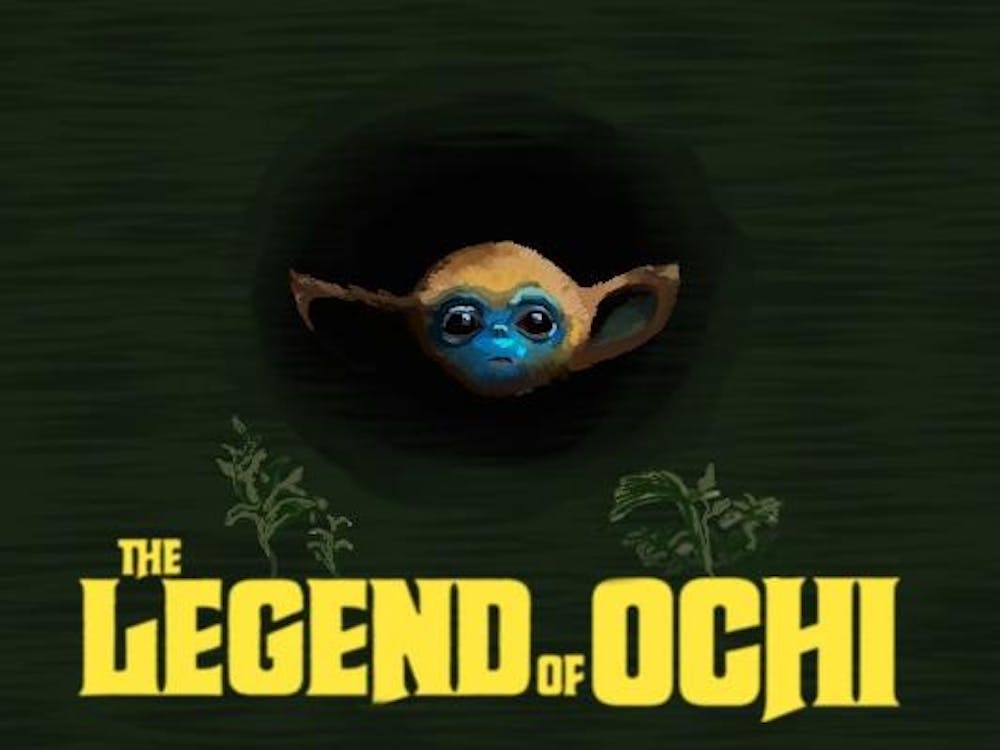The crowd of football fans erupted in cheers when they heard the signature beat followed by the clean lyrics — “La-da-da-da-dah / It's the one and only D-O-double-G / Snoop Dogg! / La-da-da-da-dah / You know I'm mobbin' with the D.R.E.”
California natives Dr. Dre, Snoop Dogg and Kendrick Lamar all took the stage at SoFi stadium in Inglewood, California, alongside the queen of hip-hop soul, Mary J. Blige, and Detroit rapper Eminem at the Super Bowl Sunday. The all-star lineup brought a night of nostalgia, surprise guests and love for West Coast culture.
Dre began the show rising up from behind a mixing desk of a makeshift recording studio — the most significant location of his career — as the camera panned to an all-white stage design featuring lowriders and references to local landmarks in Compton, Dre’s hometown.
While performing “The Next Episode,” the chemistry between Snoop and Dre set the tone for the rest of the show, as it was impossible not to bop your head to this hip-hop classic. Despite performing the song countless times leading up to the halftime show, Snoop — rapping effortlessly to the famous guitar riff in his Los Angeles Rams-inspired outfit — was a sight to behold.
Transitioning to “California Love'' with choreography and costume design similar to the 1995 music video, the halftime show became a love letter to all things California. Graciously, Dre gave the spotlight to the East Coast rapper and surprise guest, 50 Cent, who — in an iconic manner — referenced his 2009 hit “In Da Club” by performing upside down.
East Coast appreciation didn't stop there as Bronx native Mary J. Blige performed her hits, “Family Affair” — a song produced by Dre — and “No More Drama.” Unlike anything else thus far, the performance led to silence from the 70,000 viewers at the venue, as they admired Blige’s singing — “Gotta count on me / Cause I can guarantee that I'll be fine” on a lasting high note. Although the choreography was simple, her vocals and emotional range was a definite highlight of the night.
As each artist performed, the crowd's enthusiasm grew louder. From beginning to end, the cheers did not stop, especially since the halftime show was a trip down memory lane for many millennials. However, the momentum shifted as a more recent defining rapper of the current generation — Kendrick Lamar — took the stage.
A bird’s eye view shot showing an illuminated map of Los Angeles introduced the Pulitzer Prize winner in a fluid fashion. Lamar blended in with his background dancers, who all wore black suits, distinguishing himself with sunglasses and a custom Louis Vuitton suit — a piece from the final collection of the late Virgil Abloh. He proceeded to march with his dancers, who all wore sashes that said “Dre Day” — referencing the 1993 song by Dre. Lamar’s isolated vocals with the emphasis of the drums on “m.A.A.d city” and “Alright” highlighted his deep and meaningful lyrics. He concluded his performance with freestyling, giving his respect to Dre as he rapped, “35 summers in the making / Stop faking / You forgot about Dre / 35 summers in the making / I'm talking N.W.A.”
The song reached new heights as it became an anthem in the wake of the George Floyd protests, credited as an anthem of Black power and perseverance. In his performance, though, Lamar skipped the more controversial lyrics “We hate po-po / Wanna kill us in the street fo sho” — some speculated that the NFL censored Lamar, though the organization denied asking Lamar to cut the lyric.
Since the inception of “F**k Tha Police” by N.W.A — a hip-hop group featuring Dre — the topic of police in rap songs has been a sensitive issue. In 1989, the FBI sent N.W.A a warning letter concerning their violent lyrics towards the police, spiraling into an ongoing censorship on the topic, despite the fact that rappers only mention historical events in “Alright.”
Also seen with the opening lyrics of “The Next Episode,” a majority of explicit lyrics were censored, a common problem for rappers. Although the rappers did not appear uncomfortable censoring their lyrics while onstage, after the performance, Dre expressed his disapproval of the alleged attempts of the NFL to control what lyrics could be performed.
Another Aftermath Records signee performed after Lamar — Eminem. Eminem hinted at his song “Forgot About Dre,” and quickly segued straight into one of the greatest motivational songs of all time — “Lose Yourself.” The performance included no choreography or unique visuals, meaning the lyrics alone carried. Even Eminem’s surprise guest drummer Anderson .Paak was seen mouthing the lyrics as the stadium lights followed the cadence of his drums.
Social media lit up when Eminem kneeled at the end of his act, with some speculating that he was referring to the former NFL quarterback Colin Kaepernick, who first took a knee in 2016 as a form of protest against racial inequality. Kaepernick’s decision to take a knee during the national anthem was seen by the public as disrespectful to soldiers and veterans, even though veteran Nate Boyer created the idea and convinced Kaepernick to do so. Since then, athletes in various televised sporting events have taken a knee in solidarity.
While Eminem knelt alongside the piano, Dre concluded the night by playing the most popular piano chords in hip-hop history. Similarly to Eminem’s act of rebellion and connection to his roots of N.W.A, Dre included the lyrics “still not loving police” as he performed “Still Dre.” Every artist stood alongside Dre as they all joined the chorus. It was a moment of beautiful symbolism as, in one way or another, they can thank him for shaping their careers. Snoop Dogg was signed by Dre’s previous label, Death Row Records. Lamar, Eminem, 50 Cent and Anderson .Paak were all signed to Dre’s current label, Aftermath Records. More importantly, Dre helped produce countless tracks for every artist who performed.
The halftime show refused to resort to cheap gimmicks such as fireworks, costume changes and moving sets. It was simply good music by good artists. The remarkably high inclusion of Black backup dancers, Black instrumentalists and controversial lyrics – despite the censorship – was a true expression of the hip-hop genre. Already being referred to as “The Greatest Halftime Show Ever” and trending on Youtube with over 35 million views, the performance was a success and likely a once in lifetime moment as each of these talented artists shared the same stage.







